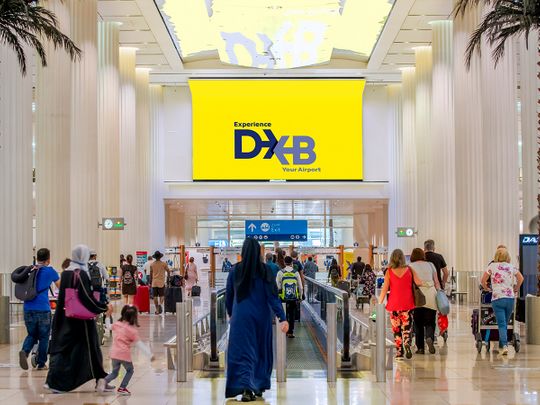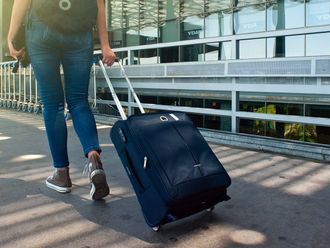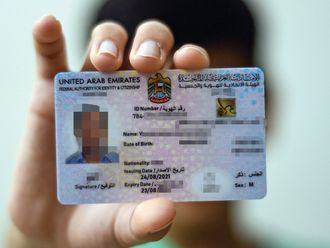
Dubai: As of February 22, Dubai and Sharjah airport have scrapped the rapid PCR COVID-19 test at departing airports for passengers arriving from India, Pakistan and other countries.
Countries that do not require rapid PCR tests
Dubai and Sharjah airport announced that passengers from these countries do not require a rapid PCR test at the airport six hours before departure:
- India
- Pakistan
- Kenya
- Nepal
- Sri Lanka
- Bangladesh
- Egypt
- Uganda
Passengers arriving from the countries mentioned above will still need to present a negative PCR test result within 48 hours before departure.
So if you are planning to visit the UAE soon or are confused about the requirements for testing, vaccination and quarantine in the UAE here is a breakdown of all the guidelines you need to follow.
Travelling to Dubai
As of January 27, 2022, the UAE government’s official website – u.ae – provides the following rules for travelling to Dubai.
Residence visa holders - When do I need an ICP or GDRFA approval?
As per u.ae, all UAE residents can travel to Dubai without an approval from the General Directorate of Residency and Foreigners Affairs (GDRFA) or the Federal Authority for Identity, Citizenship and Ports Security (ICP). However, residents travelling from the following countries will need an approval:
• Bangladesh
• India
• Pakistan
• Sri Lanka
Exceptions
As per u.ae, the ICP or GDRFA approval is not needed for those who have received:
• A newly issued residence or employment visa
• A short stay or long stay visa
• 10-year UAE Golden Visa
• Investor or partner visa
• Visit visa
• Visa on arrival.
Requirements for passengers from the countries mentioned above
Passengers arriving from the countries mentioned above must present
A negative result - along with a QR code - of a COVID 19 PCR (Polymerase Chain Reaction) test conducted at an approved health facility within 48 hours before departure.
Rules for all passengers travelling to Dubai
Passengers travelling to Dubai from all countries, including the Gulf Cooperation Council countries (GCC), must have a negative result for a COVID 19 RT-PCR test. The duration within which the test needs to be taken can vary from 48 to 72 hours before departure time.
Rules for travel or transit from the United Kingdom (UK) for all types of visas
All passengers travelling or transiting to Dubai from the UK must hold a negative result for a COVID 19 RT-PCR test done no more than 48 hours before departure. The RT PCR negative test result certificate must contain a QR code and state the location where the sample was taken.
Any other test certificates, including NHS COVID 19 test certificates, antibody tests, and home or self-test kits are not accepted for travel.
The following passengers are exempt from the testing requirements:
• UAE nationals, their first-degree relative(s) and their domestic helpers, as they will be required to undergo COVID 19 PCR test on arrival in Dubai.
• Children below 12 years of age
• Passengers with moderate to severe disabilities.
Rules for travel from Angola, Cote d'Ivoire, Indonesia and Vietnam
Passengers traveling to Dubai from Angola, Cote d'Ivoire, Indonesia and Vietnam must present a negative result for a COVID 19 RT-PCR test done no more than 72 hours before departure. The test certificate must include a QR code.
Other countries
From January 29, 2022, all passengers arriving in Dubai as their final destination, from the countries mentioned below must present a negative COVID-19 RT-PCR test certificate with a QR code, with the test conducted no more than 48 hours before departure:
• Argentina
• Botswana
• Burundi
• Chad
• Colombia
• Republic of the Congo
• Democratic Republic of the Congo
• Egypt
• Eswatini
• Ethiopia
• Ghana
• Guinea
• Kenya
• Lebanon
• Lesotho
• Liberia
• Mauritania
• Mexico
• Mozambique
• Namibia
• Nigeria
• Rwanda
• Sierra Leone
• South Africa
• Sudan
• Tajikistan
• Tanzania
• Turkey
• Uganda
• Uzbekistan
• Zambia
• Zimbabwe
Passengers from other countries need to present a negative PCR test result, with the test taken no more than 72 hours before departure.
Mandatory test on arrival
All passengers arriving in Dubai from the following countries will be required to take another COVID 19 RT-PCR test on arrival at Dubai’s airports:
• Afghanistan
• Angola
• Argentina
• Azerbaijan
• Bangladesh
• Bosnia & Herzegovina
• Brazil
• Botswana
• Burundi
• Cambodia
• Chad
• Chile
• Democratic Republic of Congo
• Djibouti
• Egypt
• Eritrea
• Eswatini
• Ethiopia
• Georgia
• Ghana
• Guinea
• India
• Iran
• Iraq
• Ivory Coast
• Jordan
• Kenya
• Kyrgyzstan
• Lebanon
• Lesotho
• Liberia
• Mauritania
• Morocco
• Mozambique
• Myanmar
• Namibia
• Nepal
• Nigeria
• Pakistan
• Philippines
• Republic of the Congo
• Romania
• Rwanda
• Russia
• Senegal
• Sierra Leone
• Slovakia
• Somaliland
• Somalia
• South Africa
• South Sudan
• Sri Lanka
• Sudan
• Syria
• Tajikistan
• Tanzania
• Tunisia
• Turkey
• Turkmenistan
• Uganda
• Ukraine
• Uzbekistan
• Vietnam
• Zambia
• Zimbabwe
After the airport test
Once you have taken the PCR test at the Dubai International Airport, you must remain at your place of residence until you receive the test result. If the test result is positive, you will be required to undergo isolation and follow the guidelines of Dubai Health Authority. To find out what the isolation and quarantine guidelines are in Dubai, read our detailed guide here.
You must also download the COVID19 – DXB Smart App, which is available on iOS and Android.
Rules for transit passengers
While transit passengers must complete all the requirements of their final destination, Dubai mandates that transit passengers from the following countries must present a negative result for a COVID 19 PCR test done no more than 72 hours before departure:
• Angola
• Bangladesh
• India
• Nepal
• Pakistan
• Sri Lanka
Transit passengers from Cameroon and Zambia must present a negative result for a COVID 19 PCR test (with QR code) done no more than 48 hours before departure. They must also present a negative result of a rapid PCR test report based on molecular diagnostic testing, conducted six hours before the last point of departure. The report must be with a QR code.
Traveling to Abu Dhabi
As per u.ae, you do not need to be vaccinated to fly to Abu Dhabi, but you must present a negative result of an RT-PCR test to detect COVID 19. The test should be done no more than 48 hours before departure. This applies to all travellers aged 12 years and above.
You will be exempt from testing if you either are under 12 years old or have severe disabilities.
On arrival
When you arrive in Abu Dhabi, you need to do another COVID-19 RT-PCR test. The requirements for the retests depend on whether you are travelling from a Green List country, as well as your vaccination status.
Travelling on residence visa
If you are a UAE resident, these are the steps you need to follow, as per the official website of Etihad airlines:
• Take a PCR test 48 hours before your flight
• Download the Al Hosn app
• It is advisable to apply for the ICP Smart Travel Service before you fly.
Quarantine and arrival testing
Travelling from Green list country
• Free test on arrival.
• No quarantine requirement.
• Re-test on Day 6 if you are fully vaccinated. Re-test on Day 6 and Day 9 if you are not fully vaccinated
Travelling from any other destination
• Free test on arrival.
• No quarantine requirement if you are fully vaccinated. You must quarantine for 10 days if you are not fully vaccinated
• Re-test on Day 4 and Day 8. Re-test on Day 9 if you are not fully vaccinated.
It is important to note that you must be fully vaccinated to enter most public places in Abu Dhabi.
Transit passengers
If you are transiting through Abu Dhabi, you must take your COVID 19 RT-PCR test no more than 72 hours before your first flight departure, unless the requirement at your final destination is 48 hours.
Travelling to Sharjah
As per the website of Sharjah Airport, these are the guidelines you need to follow if you are travelling to Sharjah:
• All arriving passengers to Sharjah must have a negative PCR test report, with a validity of 96 hours before departure.
• Travelers will have to undergo another PCR test upon arrival at Sharjah Airport regardless of their earlier negative report.
• All passengers must wear the mask at all times.
• Practise the social distancing of two metres inside the airport Terminal.
• Every arriving passenger must receive a Declaration Form at check-in point or onboard the flight and fill it to hand it over to the registration team on arrival.
• All arriving passengers must conduct self-quarantine in their place of stay in UAE until they receive the PCR negative result.
• In case the result is positive, then you would need to follow these quarantine procedures.








